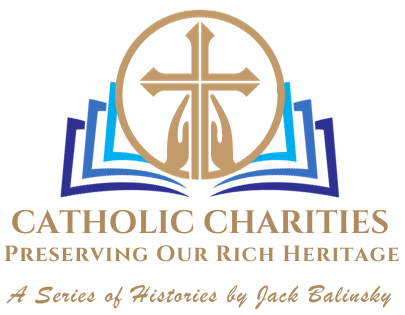Spirit Alive! Fifty Years of Consistent Life Ethic Advocacy and Parish Social Ministry in the Catholic Diocese of Rochester
1958-2008
The author’s primary motive for writing this book was as a gift to Bishop Matthew Clark in recognition of his thirty years of outstanding leadership in the Diocese and his rock solid support of Catholic Charities throughout his entire tenure.
There is also a second important purpose which underlies this work. To understand this second purpose, it is important to understand the history of Catholic Charities in the country over the last hundred years.
The Roots of Catholic Charities
The roots of Catholic Charities came in part from the experience of the immigrant groups who came to the United States from the early 1800’s through the early 1900’s. Like most newcomers, “strangers”, etc. Catholics were to some degree shunned by civil society, hence the establishment of Catholic schools and Catholic healthcare institutions. For the early immigrant church, the parish was the vehicle for provision of social services. By the early 1900’s church leaders came to realize that social services could be provided more effectively by what became known as centralized “Bureaus of Catholic Charities”. The first national meeting of leaders of these newly created Diocesan Catholic Charities was held in Washington in 1910.
In broad-brush strokes, Catholic Charities remained over the next fifty years an organization run by Catholics to provide emergency and family oriented services to Catholics.
Developing a Mission Statement for the Organization
With the Second Vatican Council, the civil rights movement and especially the greatly enhanced availability of government funding, Catholic Charities services expanded quickly in the 1960’s.
By the mid to late 1960’s, Catholic Charities directors were asking questions like:
- Although we can provide a wide variety of services, what services should we provide?
- What’s Catholic about Catholic Charities?
- How are we different from the family services agency down the street?
- What about our rootedness in and connectedness with parishes?
To answer these questions, the national organization, then known as the National Conference of Catholic Charities Directors (now known as Catholic Charities USA) appointed a group to develop a mission statement for the organization in light of then existing realities. (I am proud to report that a number of this group have been my mentors for nearly 40 years.) This group presented a three-fold mission statement adopted at the national meeting in Miami, which with some modest tweaking over the intervening time, still represents today what Catholic Charities is about.
- Providing quality direct services which empower persons
- Advocating for public policy priorities which enable persons to achieve their highest human potential
- Acting as leaven to help individuals and faith communities of all denominations to respond to the Baptismal call to love our neighbor.
Having been on the scene over this time period, the author perceives that while Catholic Charities agencies across the country continue to excel at providing direct services, activities to carry out the other two elements of the mission statement have not received as much priority attention.
This book, then, is written in anticipation of many activities which will be undertaken over the next year to celebrate the 100th anniversary of Catholic Charities in this country to emphasize these parts of our mission and to show how they have been lived out in the Rochester Diocese under the leadership of Bishop Clark.

